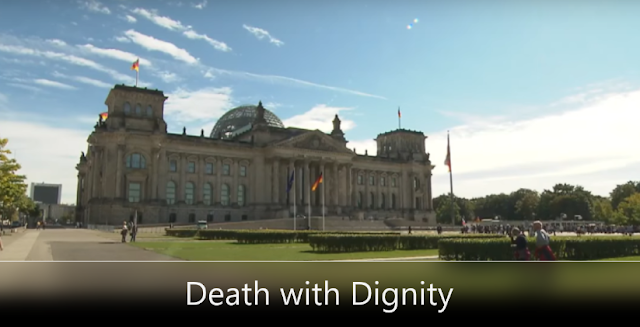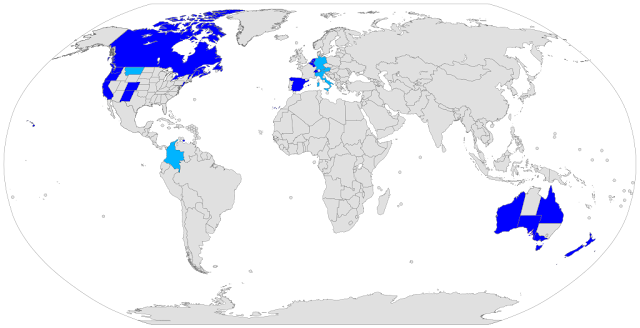Autonomy how to live and how to die
I believe in death with dignity. It has different labels and definitions …
Death with dignity must be a human right: to retain autonomy until the very end and, before one’s body is overtaken by pain, if the quality of one’s life is or will became unbearable, to decide to end one‘s suffering; the dignity comes from exercising the choice.
No matter how old, how young, how rich or poor, how sick or healthy - whoever is tired of life has the right commit suicide and to get help with suicide. The German Constitutional Court took a clear stand on assisted suicide in February 2020.
For me, this topic is about autonomy, individuality, self-determination and own and unique perspective on life and what comes after, as well as when and how it should happen.
The decision to commit suicide affects fundamental questions of human existence and like no other decision affects the identity and individuality of people – and furthermore questions about ethics, values, and recognition of an existential and ultimate desire of a person - what can have a higher meaning?
The right to a self-determined death as expression of the right to freedom of personal development is and should not be limited to situations as severe or incurable illnesses or certain phases of life and illness. It must exist in every phase of life.
Self-determination instead of “fate”, “fortune”, “karma”, or “God's will” - autonomy and self-sufficiency of the individual must take priority over interests, paradigm, belief systems and statements of faith from third parties and religious institutions or any other third parties.
The end of life is seldom easy or beautiful. But it is inevitable and unavoidable. Fate or “God's will” are or were the labeling which our earlier generations called dying and death. They were mostly accepted as they came. But our plural, modern society allows and even expects everyone to take their fate into their own hands - in life as well as in death. That’s the way I understand it.
By what right does people or religious confraternity or ideologies could one forbid a person to put an end to their life? Again and again when I talk about this topic I hear from people the argument, that suffering is part of life. In general, I agree that suffering is an inevitable part of life, from aging and death to heartbreak and disappointment. It is a statement which I heard from several people, e.g. church representatives unchanged for decades - but also from politicians and doctors. Or also the argument, that life is a precious gift from God.
That could be significant and meaningful as an individual belief or orthodox, strictly religious commandment, but not as dictate, precept, rule or law for all people.
I can hardly remember how often have I heard the following sentences from my wife, but also from other people:
I do think that it should be established that during these end-of-life phase it can also be a medical task to help people commit suicide. Who else has as more knowledge of life and death than a doctor? Who would be more knowledgeable and knowledgeable than a doctor? So that a peaceful and humane death is possible.
The judgment of the German Constitutional Court now allow euthanasia associations, medical specialists but also doctors to help and the changed laws of four State Chambers of physicians in Germany (Bavaria, Baden-Wuerttemberg, Saxony-Anhalt and Berlin) changed this as well and allowed doctors to help. But the legislature is still required to regulate this – so that legal certainty is given for all federal states, for Germany at all, or in whole Europe and at best worldwide.
These thoughts of mine - should not be an invitation to die gently. But my wife wanted a gentle, dignified life, without suffering and without humiliation in care. And that's what I'm about - let people have their will and dignity.
In my opinion, self-determination to live and die includes participation and showing empathy to the other – to the other who is in this situation, this challenging phase – while they have to fight with themselves in order to get to a decision.
- assisted dying
- assisted suicide
- voluntary euthanasia
Death with dignity must be a human right: to retain autonomy until the very end and, before one’s body is overtaken by pain, if the quality of one’s life is or will became unbearable, to decide to end one‘s suffering; the dignity comes from exercising the choice.
No matter how old, how young, how rich or poor, how sick or healthy - whoever is tired of life has the right commit suicide and to get help with suicide. The German Constitutional Court took a clear stand on assisted suicide in February 2020.
For me, this topic is about autonomy, individuality, self-determination and own and unique perspective on life and what comes after, as well as when and how it should happen.
The decision to commit suicide affects fundamental questions of human existence and like no other decision affects the identity and individuality of people – and furthermore questions about ethics, values, and recognition of an existential and ultimate desire of a person - what can have a higher meaning?
The right to a self-determined death as expression of the right to freedom of personal development is and should not be limited to situations as severe or incurable illnesses or certain phases of life and illness. It must exist in every phase of life.
Self-determination instead of “fate”, “fortune”, “karma”, or “God's will” - autonomy and self-sufficiency of the individual must take priority over interests, paradigm, belief systems and statements of faith from third parties and religious institutions or any other third parties.
The end of life is seldom easy or beautiful. But it is inevitable and unavoidable. Fate or “God's will” are or were the labeling which our earlier generations called dying and death. They were mostly accepted as they came. But our plural, modern society allows and even expects everyone to take their fate into their own hands - in life as well as in death. That’s the way I understand it.
By what right does people or religious confraternity or ideologies could one forbid a person to put an end to their life? Again and again when I talk about this topic I hear from people the argument, that suffering is part of life. In general, I agree that suffering is an inevitable part of life, from aging and death to heartbreak and disappointment. It is a statement which I heard from several people, e.g. church representatives unchanged for decades - but also from politicians and doctors. Or also the argument, that life is a precious gift from God.
That could be significant and meaningful as an individual belief or orthodox, strictly religious commandment, but not as dictate, precept, rule or law for all people.
I can hardly remember how often have I heard the following sentences from my wife, but also from other people:
“I would like to end my life in decent and humane conditions, that would be for example with a drug. And no torture, shortness of breath - just fall asleep and never wake up. ”
After many bureaucratic hurdles, my wife received such a drug and fell asleep / passes away so peacefully with her own sense of humor and was able to pass the bridge to the other side.
I do think that it should be established that during these end-of-life phase it can also be a medical task to help people commit suicide. Who else has as more knowledge of life and death than a doctor? Who would be more knowledgeable and knowledgeable than a doctor? So that a peaceful and humane death is possible.
The judgment of the German Constitutional Court now allow euthanasia associations, medical specialists but also doctors to help and the changed laws of four State Chambers of physicians in Germany (Bavaria, Baden-Wuerttemberg, Saxony-Anhalt and Berlin) changed this as well and allowed doctors to help. But the legislature is still required to regulate this – so that legal certainty is given for all federal states, for Germany at all, or in whole Europe and at best worldwide.
These thoughts of mine - should not be an invitation to die gently. But my wife wanted a gentle, dignified life, without suffering and without humiliation in care. And that's what I'm about - let people have their will and dignity.
In my opinion, self-determination to live and die includes participation and showing empathy to the other – to the other who is in this situation, this challenging phase – while they have to fight with themselves in order to get to a decision.
For me it is an important point that the unique, personal responsibility of other people is seen, acknowledged, challenged and finally respected much more - for life but also for death.
When we realize that someone, perhaps out of short-term desperation, or out of an erroneous assessment of the situation, or in the expectation that the treatment will be unbearable, is thinking about such an ultimate step – we must show them that it is worth living on.
But on the other hand … if this person is in the position / able to explain themselves – nobody should determine from the outside that the person has to pass through something they don't want – and to die some point down the line / someday in the future- just because third parties demand it, and that no matter how undignified a life becomes, the person concerned has to endure this up to an indefinite day.
It's about self-determination in life and death - autonomy how to live and how to die.
But on the other hand … if this person is in the position / able to explain themselves – nobody should determine from the outside that the person has to pass through something they don't want – and to die some point down the line / someday in the future- just because third parties demand it, and that no matter how undignified a life becomes, the person concerned has to endure this up to an indefinite day.
It's about self-determination in life and death - autonomy how to live and how to die.
I wish that everyone who want to make this ultimate step can spend their final days with peace of mind, with the people they love around them.






If you like - Please send me your comment, or suggestion you may have. I will not publish the comments. If you want a reply please don't forget to leave your contact information.
ReplyDelete